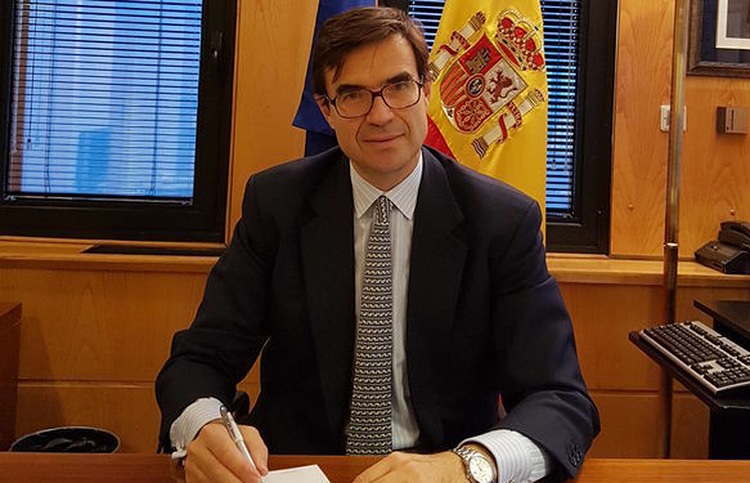Luis Ayllón
EU State Secretary Juan González-Barba, who was dismissed from his post by the Council of Ministers yesterday, had aspired to be appointed UN Secretary General Antonio Guterres’ special envoy for Cyprus, but did not receive the backing of the Spanish government, The Diplomat has learned from reliable sources.
The lack of backing has caused surprise among the parties involved, mainly Cyprus, Greece and, above all, Turkey, which were in agreement that González-Barba could fill a post that has been vacant since the end of the mandate of the American Jane Holl Lute in July.
González-Barba was relieved yesterday by Pascual Navarro -who was Secretary General of the EU- as head of the State Secretariat, thus consummating something that had been expected for several weeks among the senior officials of the Ministry of Foreign Affairs, following evidence of a rift with the head of the department, José Manuel Albares.
Although González-Barba was the only one of the state secretaries appointed by the previous minister, Arancha González Laya, to be kept in his post by Albares after his arrival at the Palace of Santa Cruz last July, disagreements began to accumulate, not so much over issues of content, but rather over the way the department functioned. Albares wanted greater control over the activities of González-Barba, whom he considered to be acting too independently.
In fact, yesterday, in a joint appearance before the press with Luxembourg’s Minister of Foreign Affairs, Jean Asselborn, Albares revealed the reasons for his decision to relieve González-Barba, stating that ‘Spain’s foreign policy and action, and even more so that of the EU, is set by the President of the Government, and from there, the cohesion behind what the President of the Government sets in all areas of foreign policy, and for the EU, where the European Councils are so fundamental’.
The disagreement with his State Secretary even led the minister to decide not to accompany the President of the Government, Pedro Sánchez, to the European Council meeting held last week in Brussels, something he always did.
Given the lack of understanding, González-Barba, according to sources consulted by The Diplomat, opted to look for a way out after leaving the post of Secretary of State, which included being appointed ambassador to a European country or, alternatively, obtaining the Government’s support to be appointed special envoy of the UN Secretary General for Cyprus.
The latter possibility was nipped in the bud, given the minister’s lack of support for the appointment, despite the fact that the parties involved, mainly Cyprus and Turkey, were in agreement, which was essential for the UN Secretary General to be able to carry out the appointment.
The sources consulted pointed out that the initiative to propose González-Barba’s name came more than a month ago from the Cypriot Minister of Foreign Affairs, Nikos Christodoulides, and was passed on to the Turkish government. It seems that the Turkish president, Recep Tayip Erdogan, expressed his agreement to the Spanish authorities during the bilateral summit held on 17 November in Ankara. For its part, Greece, through its alternate foreign minister, Meltiadis Varvitsiotis, also reportedly indicated to González-Barba himself, when they met in Seville on 23 November, that, if the candidacy was proposed, it would have Greek support.
González-Barba, who was stationed in Athens and speaks Greek, has also been Spain’s ambassador to Turkey, a circumstance that would have favourably influenced the Turks to back his candidacy, despite Ankara’s traditional reservations about a European handling the Cyprus dossier at the United Nations.
The prospect of González-Barba’s appointment, according to the same sources, was also enthusiastically welcomed by the European External Action Service, which is headed by the EU’s High Representative for Foreign Policy, Josep Borrell.
The possibility of the initiative going ahead was apparently kept alive until 9 December, when the President of Cyprus, Nikos Anastasiadis, made a working visit to Spain. Subsequently, on 14 and 15 December, Minister Albares made two visits to Greece and Cyprus, due to the misgivings aroused in those countries by the Spanish-Turkish summit in November. In these meetings, Albares reportedly made it known to his interlocutors that González-Barba would not have the support of the Spanish government for the post, a decision that would have to do with the differences they had been maintaining.
Diplomatic circles consulted by The Diplomat have been surprised by the lack of support for a candidacy that had a good chance of success and that could alleviate the failures achieved in recent years with various proposals to place a Spaniard at the head of international organisations.
This was the case, among others, with the candidacy of Vice-President Nadia Calviño to head the Eurogroup, of the former Minister of Science and Research, Pedro Duque, to head the European Space Agency, of the diplomat Hansi Escobar to be the EU’s special envoy for the Middle East peace process, and of the city of León to host the European Centre for Cybersecurity.






